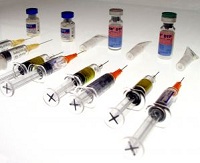 Analysts expect the U.S. vaccine market to rack up to $12.8 billion in sales for 2012. And Transparency Market Research says the industry can expect to see 5.3% growth through 2018. But low vaccination rates among U.S. adults may hamper that upward trend.
Analysts expect the U.S. vaccine market to rack up to $12.8 billion in sales for 2012. And Transparency Market Research says the industry can expect to see 5.3% growth through 2018. But low vaccination rates among U.S. adults may hamper that upward trend.
U.S. health authorities call adult vaccination rates "unacceptably low," saying only 20% of adults younger than age 65 are vaccinated against pneumococcal diseases. And only about 16% of people age 60 and older got the jab for shingles. The pneumococcal vaccine target rates sit well below the 60% for adults and 90% for those older than 65 the CDC desires.
Vaccination rates against human papillomavirus don't look much better, hovering around 30% for women ages 19 to 26 and 2.1% for men in the same age group.
"Substantial improvement in adult vaccination is needed to reduce the health consequences of vaccine-preventable diseases among adults," the CDC wrote in its report.
Not only does this mean vaccine makers aren't preventing more people from contracting these diseases--the nation experienced an estimated 42,000 cases of pertussis in 2012--but they're missing out on valuable marketing opportunities.
The vaccine market is definitely growing. But it's not growing with the gusto it could if actual vaccination rates matched the CDC's target rates. Pfizer's ($PFE) Prevnar 13, the top-selling vaccine worldwide, is expected to hit sales of $6.7 billion by 2018. And GlaxoSmithKline ($GSK), which owned 22.5% of the market in 2011, is expected to have 22%--$8.8 billion--by 2018. The worldwide market is expected to jump 7%, hitting $39.9 billion by 2018.
The CDC says a combination of education about vaccines, increased access to vaccination services, reminder systems and routine assessments of adult vaccination needs could drive up lagging vaccination rates. Some companies already employ these tactics. GSK teamed up with Vodafone to send text messages to alert mothers in Africa to the availability of vaccines and help them schedule appointments. Pfizer promotes a smartphone app called VaxText that sends messages to parents about their children's vaccination schedules. The effort should help; as vaccination rates go up, increased sales will likely follow.
- read the CDC's report
- get more from Bloomberg